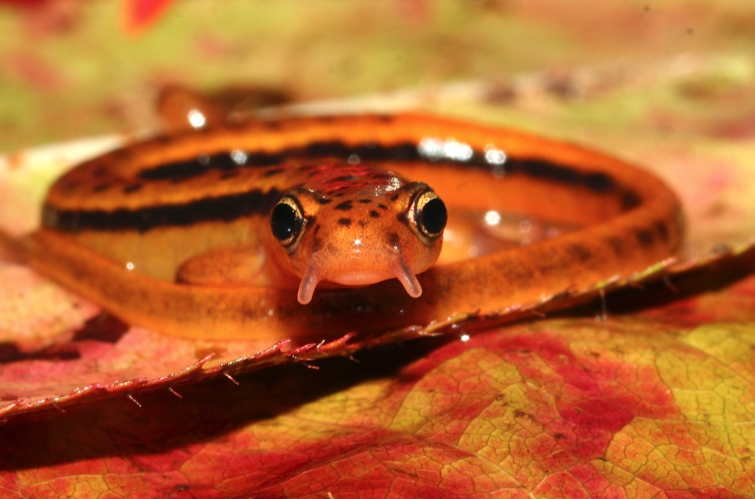Amphibians
Amphibians are found worldwide, with over 7,300 described species and hundreds of undescribed species in the tropics and elsewhere. North Carolina has an exceptionally rich and taxonomically diverse group of amphibians for a temperate area of the world. Our current list includes 31 species of frogs and 69 species of salamanders, including several new species that have been described in the last few years.
 All of our North Carolina frogs have life cycles that involve an aquatic larval stage (tadpole) and a terrestrial adult stage, while salamanders show a greater diversity of lifestyles. These include permanently aquatic species with gills such as the Neuse River Waterdog, species with aquatic larval and terrestrial adult stages like the Spotted Salamander, and terrestrial breeders that skip the larval stage and lay eggs underground such as the Red-legged Salamander.
All of our North Carolina frogs have life cycles that involve an aquatic larval stage (tadpole) and a terrestrial adult stage, while salamanders show a greater diversity of lifestyles. These include permanently aquatic species with gills such as the Neuse River Waterdog, species with aquatic larval and terrestrial adult stages like the Spotted Salamander, and terrestrial breeders that skip the larval stage and lay eggs underground such as the Red-legged Salamander.
Amphibians play important ecological roles in both aquatic and terrestrial habitats. Tadpoles and salamander larvae are an important food source for aquatic organisms such as crayfishes, aquatic insects, and fishes, and the adults are taken by snakes, turtles, birds, and mammals. Salamanders are strict carnivores and consume large numbers of both aquatic and terrestrial invertebrates. In rich cove forests in the Blue Ridge, the biomass of salamanders may be 10 times greater than that of birds that live in the same community!
 Amphibians have undergone marked declines around the world, with as many as a third of the species in risk of extinction. Factors that have contributed to declines include emerging diseases that have been introduced around the world, the loss of wetlands, climate change, deforestation and fragmentation of landscapes, illegal collecting, urbanization, environmental pollutants, and increased road traffic that kills migrating animals. North Carolina’s amphibians have been adversely affected by most of these factors, and most species have declined since European colonization.
Amphibians have undergone marked declines around the world, with as many as a third of the species in risk of extinction. Factors that have contributed to declines include emerging diseases that have been introduced around the world, the loss of wetlands, climate change, deforestation and fragmentation of landscapes, illegal collecting, urbanization, environmental pollutants, and increased road traffic that kills migrating animals. North Carolina’s amphibians have been adversely affected by most of these factors, and most species have declined since European colonization.